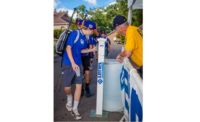
|
| The Fisher Cats’ Stadium in New Hampshire is now protected by a new, addressable fire alarm from Fire-Lite Alarms. |
Fire-Lite Alarms by Honeywell, Northford, Conn., hit a homerun for the New Hampshire Fisher Cats, the Toronto Blue Jays’ Double-A affiliate team, through the replacement of its stadium’s old, damaged fire system with a new Fire-Lite Alarms addressable fire system offering more robust surge protection.The old legacy system was badly damaged in a snowstorm when a power surge took the system offline and damaged a number of integral components, leaving the stadium vulnerable.
Stadium officials worked with fire alarm and security integrator Capitol Alarm Systems Inc., of Penacook, N.H., to identify a more reliable, surge-resistant replacement.
Value and dependability were two key factors stadium officials were looking for when they chose to go with the Fire-Lite Alarms system, said Shaun Meredith, director of facilities at Northeast Delta Dental Stadium, the Fisher Cats’ home base.
“It’s a large investment for us and we wanted to make sure we were getting a good value for what we were paying for,” he explained. “It’s a ballpark; it’s a large facility and we needed a dependable system that would allow us to identify and take care of any issues as quickly as possible.”
The fate of the old fire alarm’s run-in with transient voltage made the Fire-Lite system that much more attractive. To increase protection against electric shock damage to its systems, Fire-Lite Alarms recently redesigned its control panels’ major hardware components to offer more robust surge protection. For fast diagnostic purposes, new color-coded LED lights were also added, which indicate status of the panel’s operations, and when necessary, where service on the system is needed.
At the heart of the stadium’s new system is an MS-9200UDLS fire alarm control panel from Fire-Lite Alarms. The compact system can monitor as many as 198 initiating devices, such as detectors and pull stations.
“It was low-cost, low-budget, but high-quality — all the things you want,” said Roger Laro, Capitol Alarms’ vice president of operations. “We put it in, got it inspected, and they had a flawless opening day.”
The stadium managers were looking for a system that was simple to operate and simple to maintain, Laro explained. The MS-9200UDLS panel contains a single circuit board, mounted to its enclosure by a quick-remove chassis — an installer-requested element now part of all Fire-Lite Alarms panels. According to Laro, this unique feature makes a fix simple.
“If there’s a problem, you just put in a new board — you’re in and out in an hour,” exclaimed Laro.
Considering the stadium’s old system was constructed on proprietary technology, facility management favored Fire-Lite Alarms’ open source capabilities, which allow service to be performed by any qualified company and even the knowledgeable facilities staff. Being lockedinto one service provider for all system fixes, big and small, at non-negotiable prices, is one situation stadium management wanted to avoid.
“They can save themselves time, money and effort, without having to call us in,” said Laro.
The system was rounded out with five addressable duct detectors, numerous remote test sensors and indicators in elevator pits, hard-to-get-to spaces and rooms and other places. Laro ran 24 circuits of visual strobes and a 32-zone graphic annunciator, as well.
The Fire-Lite Alarms system communicates all alarms, troubles and supervisory issues to a central monitoring station while simultaneously reporting those same signals to stadium officials via email. For convenient updates on the system’s status, including alarms, Capitol Alarm installed a remote annunciator in the stadium’s front entryway.
“They’ve got a system they can depend on, a system that notifies them about any problems before the authorities call them and ask them to come down,” said Laro.
The new fire alarm system has been protecting the Northeast Delta Dental Stadium for nearly two months, without any issues. That’s a vast improvement from the old system, which was having technological troubles on a weekly basis, said Laro.
“They’ve almost forgotten about it now,” said Laro. “It was a seamless transition.”
For information, visit www.firelite.com.







